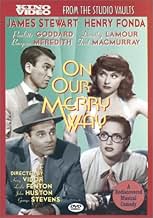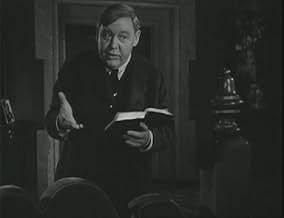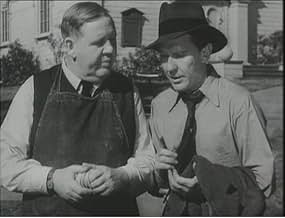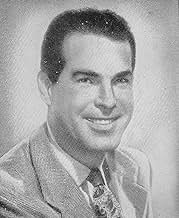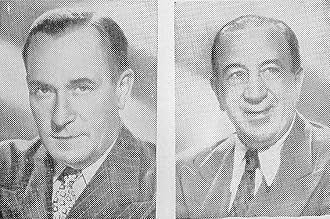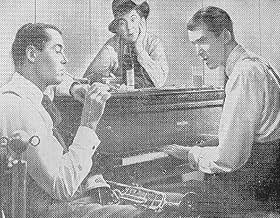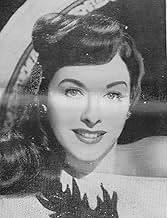CALIFICACIÓN DE IMDb
5.7/10
926
TU CALIFICACIÓN
Agrega una trama en tu idiomaThree short stories revolving around the topic of the daily question posed by the roving reporter to the readers of a daily newspaper.Three short stories revolving around the topic of the daily question posed by the roving reporter to the readers of a daily newspaper.Three short stories revolving around the topic of the daily question posed by the roving reporter to the readers of a daily newspaper.
Carl 'Alfalfa' Switzer
- Leopold 'Zoot' Wirtz
- (as Carl Switzer)
Opiniones destacadas
This three-vignettes-in-a-frame movie is not all bad. Indeed, the first segment features Henry Fonda and James Stewart in a brilliant comic pas de deux which leaves you wondering why they didn't become a cinematic pair. Given that the plot-ette they work with is unremarkable, their joint performance is even more of a miracle and a treat. Also fun is the little jazz score, which features not only Stewart doing his own tasteful piano comping, but also a guest appearance by Harry James, who not only provides the behind-the scenes music of the trumpet-playing "babe" but actually puts his mug in as well.
The second story is a bit weaker, though Dorothy Lamour does a song and dance number that sends up contemporary Hollywood clichés in a wittily sophisticated manner.
The last sequence, however, is truly lame: the pacing is slow and all the actors (especially child actor David Whorf) are annoying. The zany Hugh Herbert nicely finesses a small role but his little performance can't save the segment.
The frame itself is also uninspired, but not so deadly that it drags the film down.
Had the last two segments been as marvelous as the first, this entire movie would have been a classic. But in any case, you simply must see it for the Steward-Fonda collaboration. They command the film from the moment the camera turns on them and never disappoint.
The second story is a bit weaker, though Dorothy Lamour does a song and dance number that sends up contemporary Hollywood clichés in a wittily sophisticated manner.
The last sequence, however, is truly lame: the pacing is slow and all the actors (especially child actor David Whorf) are annoying. The zany Hugh Herbert nicely finesses a small role but his little performance can't save the segment.
The frame itself is also uninspired, but not so deadly that it drags the film down.
Had the last two segments been as marvelous as the first, this entire movie would have been a classic. But in any case, you simply must see it for the Steward-Fonda collaboration. They command the film from the moment the camera turns on them and never disappoint.
And then just sinks into boredom.
Martha Pease (Paulette Goddard) demands that her husband Oliver (Burgess Meredith) tell the newspaper where he works as the "Roving Reporter" that he be allowed to pick his own subjects. She will know if he did that by reading the next edition's Rambling Reporter column and seeing that his idea - How has a small child influenced your life? - is the theme of the column.
After leaving his apartment that morning Oliver confesses to the audience that he is not the Roving Reporter. He is in fact just a classified ad clerk, but that he told his wife this lie before they were married and hasn't had the heart to tell her the truth ever since. As a result he has been lying about his salary and thus he is in peril of having his furniture repossessed and he owes gambling debts. This is all very interesting, but then it just bogs down. And that is hard to believe when one of the vignettes involving people on the street actually being interviewed includes James Stewart and Henry Fonda, good friends in real life, on screen together.
When I first sat down to watch this I wondered why I had never heard of this one. By the time it finished I knew the answer to that question. Avoid.
Martha Pease (Paulette Goddard) demands that her husband Oliver (Burgess Meredith) tell the newspaper where he works as the "Roving Reporter" that he be allowed to pick his own subjects. She will know if he did that by reading the next edition's Rambling Reporter column and seeing that his idea - How has a small child influenced your life? - is the theme of the column.
After leaving his apartment that morning Oliver confesses to the audience that he is not the Roving Reporter. He is in fact just a classified ad clerk, but that he told his wife this lie before they were married and hasn't had the heart to tell her the truth ever since. As a result he has been lying about his salary and thus he is in peril of having his furniture repossessed and he owes gambling debts. This is all very interesting, but then it just bogs down. And that is hard to believe when one of the vignettes involving people on the street actually being interviewed includes James Stewart and Henry Fonda, good friends in real life, on screen together.
When I first sat down to watch this I wondered why I had never heard of this one. By the time it finished I knew the answer to that question. Avoid.
Before I committed to buying the DVD of "On Our Merry Way," I got it from Netflix and happy I am that I did so, for it's not likely I'd ever want to watch it again. "On Our Merry Way" is an anthology film in the manner of "O. Henry's Full House," but while the latter has a no-nonsense framework with John Steinbeck introducing the episodes, "On Our Merry Way" uses the gimmick of Burgess Meredith talking directly to the camera every so often. It doesn't work; it seems more like a vanity project for Meredith and his then wife Paulette Goddard.
Nor do the stories work. They are shaggy dog stories that bore you long before they reach a conclusion. The Henry Fonda-James Stewart and Fred MacMurray-William Demarest episodes are simply not funny. "On Our Merry Way" is full of overacting (especially from Carl "Alfalfa" Switzer) and shtick (from Victor Moore and Hugh Herbert). Dorothy Lamour, on the other hand,comes off extremely well both as an addle-pated secretary and then with a song that satirizes her own career; for Lamour it's a triumph over inferior material.
John O'Hara is credited for one of the stories, O. Henry is not, even though his "The Ransom of Red Chief" serves as the basis for the MacMurray-Demarest episode; for comparison, watch the Fred Allen-Oscar Levant take on the same story in "O. Henry's Full House." It's only minimally better but it moves faster.
It's inconceivable to me that so many great directors, credited or un-, would produce such a mess.
One can't help be grateful to Kino for clearing the copyright problems which had long kept the film in limbo; after all, we do want to preserve the work of our great stars, no matter how bad. But once our curiosity is satisfied, "On Our Merry Way" becomes a shelve-it-and-forget-it film.
For a much better pairing of Meredith and Goddard, I'd recommend Jean Renoir's English-language version of "The Diary of a Chambermaid."
Nor do the stories work. They are shaggy dog stories that bore you long before they reach a conclusion. The Henry Fonda-James Stewart and Fred MacMurray-William Demarest episodes are simply not funny. "On Our Merry Way" is full of overacting (especially from Carl "Alfalfa" Switzer) and shtick (from Victor Moore and Hugh Herbert). Dorothy Lamour, on the other hand,comes off extremely well both as an addle-pated secretary and then with a song that satirizes her own career; for Lamour it's a triumph over inferior material.
John O'Hara is credited for one of the stories, O. Henry is not, even though his "The Ransom of Red Chief" serves as the basis for the MacMurray-Demarest episode; for comparison, watch the Fred Allen-Oscar Levant take on the same story in "O. Henry's Full House." It's only minimally better but it moves faster.
It's inconceivable to me that so many great directors, credited or un-, would produce such a mess.
One can't help be grateful to Kino for clearing the copyright problems which had long kept the film in limbo; after all, we do want to preserve the work of our great stars, no matter how bad. But once our curiosity is satisfied, "On Our Merry Way" becomes a shelve-it-and-forget-it film.
For a much better pairing of Meredith and Goddard, I'd recommend Jean Renoir's English-language version of "The Diary of a Chambermaid."
Interesting story that doesn't know where it wants to go - I won't be as harsh on this film as other posters. That's perhaps because I know a little about the personal lives of two of it's stars, Burgess Meredith and Paulette Goddard. I just watched this on Kino's DVD. It's one of those rare films with multiple directors and long thought lost. Burgess Meredith and Paulette Goddard get things started for us n the opening and make a cute couple(they were married in real life at the time) and she calls him Oliver, Meredith's real life first name. Meredith plays a newspaper guy and for some reason asks the question "has a child made a difference in your life?" He is IMO trying to get an answer to make something tick for his newspaper article and/or for personal reasons ??. Though this is a scripted film the question, one get's the feeling, is a personal one for Meredith and Goddard, for in real life in 1944 Goddard suffered a miscarriage of their child, probably devastating to both of them. Unless you know that bit of trivia you won't pay but fleeting attention to the conversation between Burgess and Paulette. As stated in the summary this film has to be one of the first motion pictures to show a husband and wife sleeping together in the same bed, which is impressive considering the Breen Production Code in effect at the time. Married couples however would continue to sleep in twin beds until TV shows like The Brady Bunch in the late 1960s. The film pairs off into too many directions first with James Stewart and Henry Fonda, then with Fred MacMurray and William Demarest. Stewart and Fonda were friends in real life and that holds something for fans of the pair but their story is aimless. The duo put on a variety show reminiscent of today's American Idol. MacMurray and Demarest would famously work together again in the mid 60s on My Three Sons, after Demarest replaced William Frawley who became ill and died. MacMurray and Demarest have their comic moments especially with a precocious(in a bad way) little boy called "Sniffles". Demarest is too old for the kind of physical slapstick he's subjected to here. All in all another aimless scene. Dorothy Lamour shows up as a cutie who later dons a sarong in a musical revue. A voluptuous piece of cheesecake, famous for playing the island girl in the Crosby-Hope 'Road' pictures, her stay is all too short. This film should have stayed focused on the interesting beginnings with Meredith and Goddard. Meredith himself is not involved enough in the linking stories to make the finale cohesive. He finds what ever answer/lesson he's looking for but the audience has been shuttled from one minor point to the next. Paulette at the close of the film reveals that she's pregnant(only in the story) and she and Meredith rejoice at end. Their story should have been the main focus of the film and dare the subject of talking about pregnancy which I get at the conclusion that that's what the story was about. Instead we're taken from one inconsequential story to the next without logical tie-in to Meredith and Goddard. That's why I think so many people miss the point and poo-poo the film. But if you know the different junctures of the film especially the part with Burgess Meredith and Paulette Goddard you should be able to enjoy the picture.
¨A Miracle Can Happen" was the original title of this film , it deals with a down-and-out reporter called Oliver Pease (Burguess Meredith) gets a dose of courage from his wife Martha (Paulette Goddard) as she suggests him an interesting inquiry : "Has a little child ever changed your life?" . Oliver gets answers from two slow-talking musicians (Henry Fonda and James Stewart) , the second sequence Charles Laughton played a bible-reading minister , and the third part about an itinerant couple (Fred MacMurray , William Demarest) who is deceived by a child . In each case the "little child" is hardly innocent: in the first, a local auto mechanic's "baby" results out to be fully developed as a beautiful girl ; in the second , an unfortunate church Minister (Charles Laughton) teaches a grumpy father (Henry Hull) to learn kindness by Bible reading ; in the third, the family of a spoiled brat doesn't want him returned . Did You Ever See A Miracle Walking?
This is a sketches movie full of humor , fun situations , entertainment and amusement . Interesting screenplay by Laurence Stallings and Lou Breslow based on original story by Arch Oboler . The picture is made up of many vignettes featuring many capable stars , it belongs to sub-genre about ¨anthology film¨ ; movies like "Flesh and Fantasy" and "O. Henry's Full House" used large casts to tell several interlocked stories , though "Tales of Manhattan" is the best of the anthology films , it follows the adventures of a tuxedo's tailcoat as it passes through the hands of several diverse people , being also starred by Laughton and Fonda . This ¨A miracle can happen¨ consisted of three short stories , about 20-25 minutes each , linked by the Burgess Meredith character. Titled "A Miracle Can Happen", this film debuted on February 3, 1948 at the Warner Theatre in Manhattan , during February, the feature also opened in Philadelphia and Detroit ; in June, when released nationally, the picture ran nine minutes shorter than its original 107 minutes, and the film's name had been changed to "On Our Merry Way," thus avoiding any religious connection that moviegoers might assume by seeing the word "miracle" in the title . Nice acting by Burguess Meredith as a misfit journalist pursued by a creditor , he writes lost pet notices and looking for a good scoop he tricks the editor of the newspaper . Sensational duo formed by Henry Fonda and James Stewart , they are fabulous as an amusing couple become involved into a funny contest . Charles Laughton plays masterfully an unlucky Minister ; however, this segment was eliminated in some copies with a parody of an actress whose roles usually feature a sarong as Dorothy Lamour's South Seas movies , as the powers-that-be decided to drop this 'religious' story altogether and it was replaced by a more comic one . Independent producer David O. Selznick offered to buy the film in order to issue the Laughton sequence as a short, scrapping the rest of the picture ; Selznick's plan was rejected by producer Benedict Bogeaus and producer-star Burgess Meredith . In Spain, "A Miracle Can Happen", complete with the original Laughton sequence intact but of course without the alternative Dorothy Lamour story , as it has been released on DVD there, and retains the English-language soundtrack, the movie can now been seen as it was originally intended .
Extraordinary support cast formed by notorious secondaries such as Harry James , Victor Moore , William Demarest , Hugh Herbert , Eduardo Ciannelli , Henry Hull , John Qualen and Carl 'Alfalfa' Switzer . The film has an atmospheric cinematography carried out by four prestigious cameramen as Joseph F. Biroc , Edward Cronjager , John F. Seitz and uncredited Ernest Laszlo . Evocative and appropriate original musical score by Heinz Roemheld . The motion picture was well directed by four classic Hollywood filmmakers as King Vidor, Leslie Fenton and, uncredited, John Huston and George Stevens . Rating : Good film , 6'5/10 .Well worth watching .
This is a sketches movie full of humor , fun situations , entertainment and amusement . Interesting screenplay by Laurence Stallings and Lou Breslow based on original story by Arch Oboler . The picture is made up of many vignettes featuring many capable stars , it belongs to sub-genre about ¨anthology film¨ ; movies like "Flesh and Fantasy" and "O. Henry's Full House" used large casts to tell several interlocked stories , though "Tales of Manhattan" is the best of the anthology films , it follows the adventures of a tuxedo's tailcoat as it passes through the hands of several diverse people , being also starred by Laughton and Fonda . This ¨A miracle can happen¨ consisted of three short stories , about 20-25 minutes each , linked by the Burgess Meredith character. Titled "A Miracle Can Happen", this film debuted on February 3, 1948 at the Warner Theatre in Manhattan , during February, the feature also opened in Philadelphia and Detroit ; in June, when released nationally, the picture ran nine minutes shorter than its original 107 minutes, and the film's name had been changed to "On Our Merry Way," thus avoiding any religious connection that moviegoers might assume by seeing the word "miracle" in the title . Nice acting by Burguess Meredith as a misfit journalist pursued by a creditor , he writes lost pet notices and looking for a good scoop he tricks the editor of the newspaper . Sensational duo formed by Henry Fonda and James Stewart , they are fabulous as an amusing couple become involved into a funny contest . Charles Laughton plays masterfully an unlucky Minister ; however, this segment was eliminated in some copies with a parody of an actress whose roles usually feature a sarong as Dorothy Lamour's South Seas movies , as the powers-that-be decided to drop this 'religious' story altogether and it was replaced by a more comic one . Independent producer David O. Selznick offered to buy the film in order to issue the Laughton sequence as a short, scrapping the rest of the picture ; Selznick's plan was rejected by producer Benedict Bogeaus and producer-star Burgess Meredith . In Spain, "A Miracle Can Happen", complete with the original Laughton sequence intact but of course without the alternative Dorothy Lamour story , as it has been released on DVD there, and retains the English-language soundtrack, the movie can now been seen as it was originally intended .
Extraordinary support cast formed by notorious secondaries such as Harry James , Victor Moore , William Demarest , Hugh Herbert , Eduardo Ciannelli , Henry Hull , John Qualen and Carl 'Alfalfa' Switzer . The film has an atmospheric cinematography carried out by four prestigious cameramen as Joseph F. Biroc , Edward Cronjager , John F. Seitz and uncredited Ernest Laszlo . Evocative and appropriate original musical score by Heinz Roemheld . The motion picture was well directed by four classic Hollywood filmmakers as King Vidor, Leslie Fenton and, uncredited, John Huston and George Stevens . Rating : Good film , 6'5/10 .Well worth watching .
¿Sabías que…?
- Trivia"A Miracle Can Happen" was the original title of this film when released on Feb. 3, 1948 at the Warner Theater in Manhattan. It consisted of three short stories (about 20-25 minutes each) linked by the Burgess Meredith character. He played a reporter looking for a good scoop, and in the second sequence, Charles Laughton played a bible-reading minister. When it was released nationally in June, however, it had been decided that the religious story would be dropped and replaced by a more comic one featuring Dorothy Lamour. The film in this new version was then re-titled "On Our Merry Way". However, prints of the original film had already been sent abroad for dubbing. In Spain, "A Miracle Can Happen" became "Una Encuesta Llamada Milagro", complete with the original Laughton sequence intact (but without the alternative Lamour story). As it has been released on DVD there and retains the English-language soundtrack, the movie can be seen as it was originally intended.
- Versiones alternativasThe version released in Spain and always seen on both TV and DVD, in dubbed and subtitled versions (bearing the title card "A Miracle Can Happen"), includes the Charles Laughton episode but not the Dorothy Lamour one.
- ConexionesFeatured in Henry Fonda: The Man and His Movies (1982)
Selecciones populares
Inicia sesión para calificar y agrega a la lista de videos para obtener recomendaciones personalizadas
- How long is On Our Merry Way?Con tecnología de Alexa
Detalles
- Tiempo de ejecución1 hora 47 minutos
- Color
- Relación de aspecto
- 1.37 : 1
Contribuir a esta página
Sugiere una edición o agrega el contenido que falta

Principales brechas de datos
By what name was Por nuestro alegre camino (1948) officially released in India in English?
Responda
